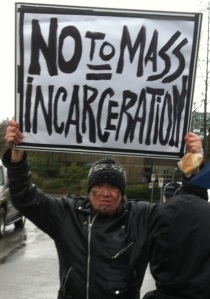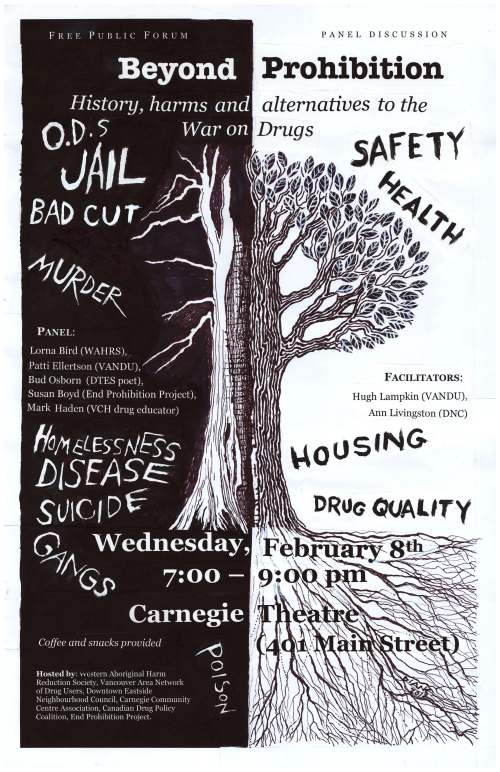A Community Dialogue
Saturday, Sept 22, 2012
9:30 am – 6:00 pm
Oppenheimer Park, Downtown Eastside, Vancouver, BC
Unceded Coast Salish Territory
Drug Prohibition uses criminalization as a means to reduce or eliminate the production, distribution and use of certain substances. As a social policy, it has been a costly failure. The financial and material resources necessary to implement it are staggering, and the various human and social costs to individuals, families and communities caught in the drug war are devastating. The persistence of prohibition, despite its obvious futility, indicates that it serves other purposes or interests. It has long functioned as a tool of race and class based social control, legitimized the expansion of the state’s militarized policing powers, and been used to justify and fund imperialist intervention and proxy wars.
On the local front, the Downtown Eastside has borne the wounds, fractures, diseases and deaths that prohibition produces, and its residents carry the alienating stigma that criminalization generates. Overdose deaths, murdered and missing women, the spread of HIV/AIDS and Hep C, child apprehensions, needless incarceration, daily police harassment and intimidation –all flow from living under the regime of drug prohibition.
It’s time to move beyond prohibition towards a framework that recognizes the desire for altered states of consciousness as a normal part of human behaviour, that develops drug policy based on public health and social justice, and that begins to address the social roots of addiction. We need to set drug use within the framework of collective self-determination and social justice not punishment and exclusion.
The Downtown Eastside has long been ground zero for the war on drugs, but it is also the site of some of the most powerful and dynamic challenges to the paradigm of prohibiton. The drug war began here over a century ago; now it’s time to stop it here.
This community gathering will open up space for popular education and dialogue around prohibition, and build momentum toward strategies for social change.
Special guest speaker: Deborah Peterson Small
Deborah Small is Executive Director of Break the Chains, an organization that seeks to build a national movement within communities of color against punitive drug policies. Break the Chains’ ultimate goal is to implement progressive drug reform policies that promote racial justice and human rights. Before assuming her position at Break the Chains, she was Director of Public Policy for the Drug Policy Alliance.
Sponsored by:
Vancouver Area Network of Drug Users
Western Aboriginal Harm Reduction Society
Canadian Drug Policy Coalition
End Prohibition Project






